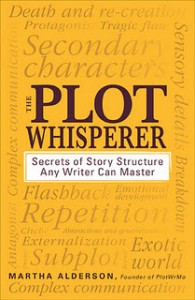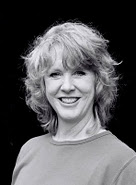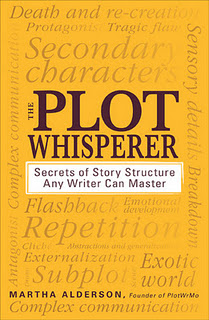As many of you know, from time to time, I like sharing writing tips and writing inspiration on my blog. Well, today, I’ve got a bit of both.
Martha Alderson, aka The Plot Whisperer, is here!
Martha has been touring the blogosphere these past two weeks, sharing her knowledge and spreading the word about her new book, THE PLOT WHISPERER: SECRETS OF STORY STRUCTURE ANY WRITER CAN MASTER (book courtesy of Adams Media, October 2011). Dude. How can you resist this title?
 Admit it. There’s a tiny voice whispering in your ear, “I need those secrets. RIGHT. NOW.” Especially if you’re in that place, you know what I’m talking about, the dark place, where you’re butting your head against your laptop and tempted to take a blowtorch to what you’ve written so far? No need to deny this. It’s okay. All of us have been there at one time or another. The only thing to do we can do, if we want to finish our masterpiece, is to put on our Big Writing Pants and keep going. But, sometimes, it’s plain hard and we lose our way.
Admit it. There’s a tiny voice whispering in your ear, “I need those secrets. RIGHT. NOW.” Especially if you’re in that place, you know what I’m talking about, the dark place, where you’re butting your head against your laptop and tempted to take a blowtorch to what you’ve written so far? No need to deny this. It’s okay. All of us have been there at one time or another. The only thing to do we can do, if we want to finish our masterpiece, is to put on our Big Writing Pants and keep going. But, sometimes, it’s plain hard and we lose our way.
Have no fear. There’s hope. Martha’s new book sheds light on how to get over our walls and back into our visions for our story.
I’m honored to have Martha here today. Want to feel empowered? Read on. Trust me. You’ll like what she has to say.
—————————-
What is the most common mistake you see writers make? What advice can you share?
Two common mistakes I see writers make is giving up before writing to the end of the story and rushing through writing the end of the story as if with eyes squeezed shut on a wing and a prayer that all of the words will add up to something meaningful and make sense in the end.
My advice? Forget about whether someone else will read your words and whether you get published or not. Worry depletes your energy.
Consider instead that writing is a practice. Something you do every day just for the heck of it, because you can’t not write, as devotion, a discipline a way of connecting to something bigger than yourself. To show up everyday and write honors yourself, that you count and the time you spend writing a story is valuable and worthy in of itself.
Nothing is more important than that moment you pluck a word from your imagination and fix it to the page. Writing teaches you about yourself, about the act of creation and gives you a bigger and deeper picture of the world around you.
 Writers can sometimes be too close to their work that they have a hard time identifying theme. What advice can you share?
Writers can sometimes be too close to their work that they have a hard time identifying theme. What advice can you share?
I discuss theme in Chapter 4 of the Plot Whisperer book and offer an exercise how to develop theme in your story. Elsewhere throughout the book, I integrate lots of novel, memoir and screenplay examples of how theme reveals itself throughout stories.
Theme is important but you can also write a good story without a profound thematic significance. Too, you can drench a story in too much thematic significance and end up drowning a good story. As in all things, balance is a good.
The more you consider theme, just like with plot and the Universal Story, the more meaning pops up everywhere in your life.
Slowly overtime, themes form a consciousness in you of where you are and suggest an alertness beyond the drama in your life and your everyday material demands to subtle signs from nature and the Universal Story.
So much of this talk about the Universal Story and theme is difficult to articulate because magical thinking is involving. Telling a story connects you to a bond and a thread that has no beginning and no end. For all time, people have been telling stories to entertain and delight and help make sense of the world around us.
Theme is like a message from deep in the belly of the story. Meaning at this level is like a discovering an email sitting in your inbox from the Universal Story with the answers to all your questions.
Is there such thing as too much tension in a manuscript? What can a writer do to fix this?
Tension is created by the fear of the unknown and pulls the reader deeper into the story. The reader senses a mystery of life will be solved and, though perhaps unable to move into the great unknown in her own life, the reader reads about a character who moves out of the safety of all she knows into an exotic and foreign world – which can simply be an new internal belief system.
Tension creates in the reader the flight or fight syndrome. Held for too long, however, tension can be exhausting. Always, in all things, balance.
Scene-by-scene build a sense of looming tension or suspense or conflict, an impending death or the end of something. Then, once the promise of what is to come is established, you have the time and space to slow the story down a bit and develop other plot lines.
Throughout the story, the reader needs time to rest from time to time. The character needs time to prepare for the energy to build again and again, each time with more impact than the last scene.
I love what you what you write in your introduction about the Universal Story. Would you please explain your forewarning, “Writing a story can expand your everyday life; it can also destroy the person you are now.”
The energy of the Universal Story rises and falls, ebbs and flows, expands and contracts and all the while is building, building, building. Around three-quarters of the way through the story, the energy reaches a point where the rubber band snaps, the energy bursts. In stories, this is often a crisis of supreme magnitude enough to send the protagonist to her knees – a breakdown with the potential for a breakthrough, the dark night of the soul. She dies to who she has always been. The crisis sets up the character transformation that comes at the climax near the end of the story.
Though that release of energy in a crisis is critical for a story, in real life, after much thought and deliberation, I truly believe the reader, the writer and we, all of us, can bypass a crisis in our own lives.
The part of the Plot Whisperer book I am the most excited about is the part about how you can look at your own life from the perspective of the Universal Story.
The Universal Story is about empowerment. The Universal Story lifts us up, gives us the power to believe in ourselves and the choice to decide what we stand for, what we’re willing to do for the highest good and what we’re willing to give up to get there.
Thank you, Martha!
———————-
 MARTHA ALDERSON has worked with hundreds of writers in sold-out plot workshops, retreats, and plot consultations for more than fifteen years. Her clients include bestselling authors, New York editors, and Hollywood movie directors. She lives in Santa Cruz, CA.
MARTHA ALDERSON has worked with hundreds of writers in sold-out plot workshops, retreats, and plot consultations for more than fifteen years. Her clients include bestselling authors, New York editors, and Hollywood movie directors. She lives in Santa Cruz, CA.
Master Schedule of the 2-week blog tour for the Plot Whisperer book.
For step-by-step guidance into pre-plotting your novel, memoir, screenplay, refer to:
The Plot Whisperer: Secrets of Story Structure Any Writer Can Master
For more about the Universal Story and writing a novel, memoir or screenplay, visit the Monday Plot Book Group series (A directory to this 2nd plot series is to the left of this post and scroll down a bit) and visit the first Plot Series: How Do I Plot a Novel, Memoir, Screenplay? on YouTube. (A directory of all the steps to the 1st plot series is to the right of this post.)
and visit:
Blockbuster Plots for Writers
Plot Whisperer on Facebook (for up-to-the-minute news on plot events, giveaways and inspiration)
Plot Whisperer on Twitter




 RSS
RSS Twitter
Twitter GoodReads
GoodReads
Hi Vivian,
Thank you for hosting this stop along the Plot Whisperer blog tour!
I loved your questions and I love your blog. It’s very inviting and open and clear. Really wonderful.
I’ll check in throughout the day to answer questions or comment on provocative comments…
Thanks again, Vivian,
martha
aka
plot whisperer
Thanks so much for your kind words, Martha! Your books and videos are a huge help. Thank you!
Hi Martha, & Vivian your interview is riveting.
The part that I have never heard before and intrigues me deeply is
“the release of the energy in a crisis is critical in a novel” Okay, this is understood.
AND
“we can bypass a crisis in our own lives” Are you saying that a person ought to see it as opportunity rather than defining it as crisis? Or something else?
This interview gives me lots to think about.
Thanks so much,
Jan K.
Hi Janet,
Fun to find you here!
Thank you for your question.
I’m proposing that you can stand back from the drama in your own life and assess where you currently are in the Universal Story AND, if you understand what the crisis stands on an archetypal level, perhaps the crisis can be averted.
Any crisis demands action. Something “bad” happens and you are required to act swiftly and consciously. The energy of (the story) your life turns into a new direction, often one you never saw coming.
Rather than the Universal Story taking things that far in order to kick you into action, perhaps with knowledge and a bit of wisdom we can kick ourselves into action, in an entirely new direction, one that fits us better than the one we’ve been struggling in and resisting and blaming and judging.
You’ve committed to a goal, you’ve been working hard, the energy and tension feels like it’s rising and you find yourself more and more uncomfortable and out of sorts, cranky and argumentative… rather than crash head-long into a crisis, stand back and take a moment. In the stillness, perhaps an answer awaits you…
fondly,
martha
aka
plot whisperer
PS — I love the whimsical icons beside our names. I’m wishing for more comments so we can a vast array of them…
Hello to you both! Martha, what wonderful material you have shared. I am looking forward to delving in more, as I’ve just found you. Thanks for doing the blog visits and letting us know about your insightful work. So helpful!!
I really NEED this book! I’m excited that you discuss theme too, and how it will weave through the entire book. Too often, I see questions like “What’s the theme of your novel?” and the answers are vague. I’m not even sure if the theme of my book is showing through the story. So, yes, I definitely need the Plot Whisperer to guide me through it.